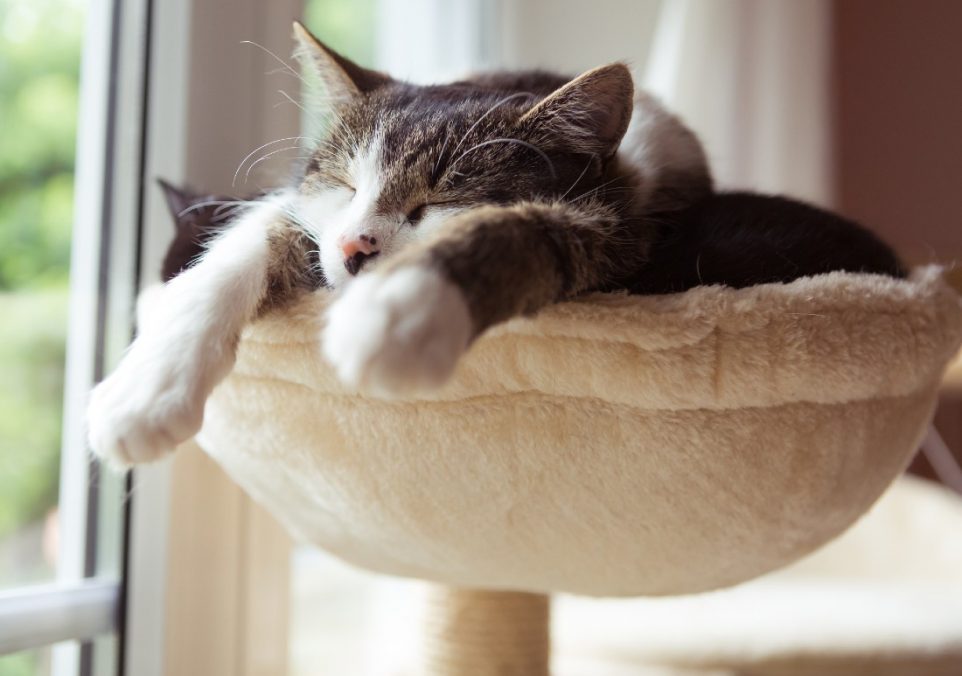Melatonin for Cats: Is It Safe?

Melatonin can play a reliable role in helping humans sleep. But when this hormone becomes a topic of discussion for our furry feline companions, pet parents may wonder if it’s a safe and effective option for cats.
This blog will delve deeper into understanding the dynamics of melatonin in felines, weighing its potential benefits and associated risks, and listening to expert opinions.
What is Melatonin?
Produced by the pineal gland in the brain, melatonin is a hormone naturally found in many living organisms, including humans. It’s responsible for regulating the circadian rhythm, affecting the sleep-wake cycles.
Because of its influential role in sleep regulation, synthetic melatonin has been carefully synthesized and offered as a dietary supplement for several years, primarily to address issues like insomnia, jet lag, and various sleep disorders.
Potential Benefits for Cats
Research on the effects of melatonin on cats is still emerging. However, anecdotal evidence and preliminary studies have shed light on its potential benefits:
- Feline alopecia: Cats sometimes experience unexplained hair loss, called idiopathic alopecia. In such scenarios, melatonin has been vet-prescribed, with some cats showing signs of hair regrowth.
- Sleep regulation: Cats, particularly older people or those with disrupted sleep patterns, might benefit from melatonin. It can potentially aid in establishing a rhythmic sleep cycle.
- Anxiety reduction: Initial studies and observations suggest melatonin could act as a calming agent, especially during episodes of heightened stress, like thunderstorms or vet visits.
Risks and Considerations
Administering any supplement or medication without thorough knowledge can lead to unintended consequences.
- Dosage Concerns: Cats have a distinct metabolic rate, and their required dosage differs vastly from humans. A precise dosage, derived after consulting a veterinarian, is of utmost importance.
- Potential Side Effects: Although rare, they’re not unheard of. Cats might exhibit symptoms like gastrointestinal disturbances, fertility changes, or a spike in heart rate.
- Drug Interactions: It’s paramount to ensure that melatonin doesn’t adversely interact with any existing medications your cat might be on. Detailed consultation with your vet is a must.
Expert Advice
Veterinary opinions always prioritize individual assessment. The understanding is simple: what works for one cat might not for another. If a cat exhibits symptoms like disrupted sleep, it’s crucial to probe deeper and diagnose any underlying health issues.
It’s noteworthy to remember that melatonin isn’t FDA-approved for feline usage while available over the counter for humans. This isn’t an outright red flag but emphasizes the need for caution. Picking a reputable brand is essential to ensure the chosen product doesn’t contain xylitol—a substance dangerous for cats.
The Role of a Cat Bed in Promoting Good Sleep
While melatonin has its discussions, ensuring a conducive sleep environment is paramount. Enter the cat bed—a sometimes overlooked accessory that can significantly influence a cat’s sleep.
- Comfort: Crafted specifically for a cat’s needs, these beds offer plush materials, warmth, and coziness. The raised edges, in particular, are perfect for cats who love curling up. Multi-level cat condos provide similar benefits, offering numerous cozy places to sleep.
- Warmth: Cats are notorious for seeking warm spots, and many cat beds use materials with excellent heat retention properties. They often find round cat beds particularly cozy, as they surround them with comforting warmth.
- Reduced stress: A cat bed provides a sense of territory, reducing potential stress. This becomes even more vital in households with multiple pets or elevated activity.
- Patterns: A well-placed, comfortable cat bed can significantly influence your cat’s sleep duration and quality, ensuring they get the restful sleep they deserve. Investing in a quality cat bed, combined with a conducive environment, can sometimes alleviate the need for any additional sleep aids.
Conclusion
Melatonin for cats, while intriguing, is a topic that requires detailed exploration, cautious optimism, and a nuanced approach. As always, the well-being of our feline companions should be the priority.
Before introducing any supplement, ensure you’ve sought expert advice, understood the pros and cons, and that you’re equipped with the knowledge to make the best decision. Sometimes, it might just be about getting that perfect cat bed and creating a tranquil environment for them to thrive.
Your Pet’s Best Interest, Always
At Pet Institute, we take pet care seriously. We're dedicated to transparency, impartiality, and the well-being of your pets in every article, review, and recommendation we provide. Our unwavering commitment to these principles ensures that you, our valued reader, always receive reliable and unbiased information. Let us be your trusted guide in the world of pet care and companionship.